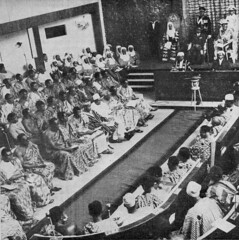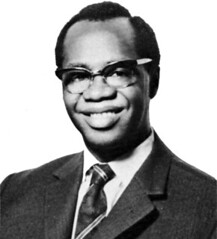The Busia Papers
Is democracy of universal application?Not exactly small talk, yet that was the kind of question I imagined being thrown around the table in my virtual dinner party. Last year's series on Social Living didn't get very far, only personal and whimsical pieces made it past the draft stage; I never quite managed to flesh out my guided tour of Ghanaian historical engagement with that theme and didn't gave voice to my dinner companions. Which leads me belatedly to the Busia papers...
One of my side-projects, much neglected in the years since I came upon this material, is the editing of a collection of the writings and speeches of Dr. Kofi Abrefa Busia, the former Prime Minister of Ghana. In the spirit of Ghana's Jubilee Year, our 50 years of independence, I thought it would be worth sharing a few of the articles in the collection. I hope some might be of interest.
- Is Democracy of Universal Application?
This essay, published in 1979, is taken from a special volume of articles on democracy on the occasion of Werner Kaägi's 70th birthday. Tightly argued, it cogently distills a lifetime of insight on the eternal topic. It is one of Busia's last published works and was written in exile only months before his death in 1978.
Busia lead the country during the Second Republic from 1969 to 1972, and was overthrown by a military coup on January 13, 1972. An eminent sociologist, he had turned to politics out of necessity and his brand of conversational politics has had a lasting legacy in Ghana. His writings however have not been as widely disseminated as they should and, sadly, many are now out of print.
Busia interests me as a prime example of Ghanaians as cultural interpreters and modern travellers. His academic career was distinguished and the scholarly works were numerous. Along with the public intellectual persona, there was the family man, the religious man. Of course there was also the politician and his was a lifelong struggle for Ghana.
There was the anti-colonial struggle along with J.B. Danquah and others. There was the post-colonial struggle and disappointment - he had to live in exile from Nkrumah's one party rule watching the country decay and his friends and colleagues detained and persecuted. There was the elation of the return in 1966 and gaining power in the 1969 elections with the promise of putting the country back on the right footing. Then again, in the bitterest setback, his government was overthrown and he was exiled again. Thus he was treated to the sight of the looting and worse of his country in his dying years.
His political progeny are currently in ascendance in Ghana, and his positions have on the whole been vindicated. Still, having foresight and being right in politics while ending up on the "wrong" side is little consolation. I find comfort however in Busia's tenacity as things fell apart. He continued to question, to argue and to persuade. There was strengh in his conviction, in the words of another of his writings, that "Ghana will be truly free and happy".
The thread that runs through the writings is the working of an extraordinary and methodical mind. One sees the intellectual energy and deep thought of a great academic. It is the great curiosity of the sociologist coupled with keen political instincts. At the same time, like many Ghanaians, he was a great storyteller, he knew how to give a speech, with biting wit that cut to the chase.
Consider the celebrated lecture on The Prospects for Democracy in Africa delivered at the Eighteenth Christmas Holiday Lectures and Discussions for Tomorrow's Citizens organized by The Council for Education in World Citizenship in London on 4th January 1961. Note well the 'world citizen' motif. Here we have Busia as the ultimate cosmopolitan, advocating democracy and methodically taking apart the often spurious arguments of expedience proffered about democracy in Africa. This is fairly representative of his style, rebutting at once the opportunists at home and the faint-hearted democrats in the West that chose, then and now, to prop up authoritarian regimes.
Explaining his turn to politics:
I loved my work as a teacher, but what was the use of sitting down in the University of Ghana trying to teach people on the basis that they will go and work in a Free Society which would have respect for their ability, whatever it was, and give them the opportunity to serve their country. What was the use of doing that when I knew that they were going to go into a built-up dictatorship that would enslave their minds.He worried that
today we have a band of leaders, some of them so anxious to strain for the big buildings, big cars and motor cycles and destructive weapons that they have forgotten that the one important contribution that the African can make to the world is to keep reminding everyone that it is out of sympathy and the love for one another that we can build eventually what is valuable and peaceful."People matter" was his favourite talking point. He was willing to sacrifice some measure of rapid economic development on the altar of social living. As he put it:
I am in the camp of those who place a higher value on democracy than on material value. I therefore do not think that countries should develop more rapidly, even if they could, than is feasible within a democratic framework. This is based on the belief that human beings are what matter most in the world.His legacy is thus all about conversational politics, about maintaining an openness to participation even when it is not expedient. There's even the minor controversy he raised later on about "not ruling out 'dialogue'" with the apartheid regime of South Africa. Even if his nuanced position would foreshadow the negotiations that transpired 20 years later, it was not a popular position for an African head of state in 1971.
As I've gone through the collection I've often found the letters and more offbeat material as illuminating as the more formal works. Discussing the encounter between Christianity and African cultures, he turns the customary question around and asks instead: "has the Christian faith been adequately presented?". Or take Ghana Since Independence - a reply for example. This was a short letter to the editor in The Friends' Quarterly (January 1965) setting the record straight about the situation in Ghana then at the height of Nkrumah's one-party rule. You get a sense of his exasperation at the amount of misinformation and cheerleading of "Socialism with an African Personality", personality cults and the like. These were stark years as I considered previously.
More heartfelt also are his reflections on one-party government in Ghana, a 1964 speech to Ghanaian students. He notes:
My political career is motivated by one thing above all. By the firm conviction that I have in my heart and my mind that all men share a common humanity. That irrespective of a man's colour he is a man; and that in Africa too, we have people who, given the right kind of leadership and the right kind of opportunity, can rise to the highest that man has risen to anywhere in the world.The rest of that speech is full of similar insight and his appeal is very direct. It is fitting that his inaugural address would reiterate this consistent theme: a "yearning concern for every individual citizen".
The final piece I'll highlight is a pamphlet titled Judge for Yourself. It was written in June 1956 as a companion to the party manifesto on the eve of the elections that would lead to independence the next year. It laid out the opposition's position on the Constitution, raising "the issue of Moral Standards" and questioning the CPP's "unwise and innefficient administration". Months later, in a memorandum titled Gold Coast Independence, he expands on the point that "there is no provision for any checks and balances" in the political structure of the First Republic. The prescient worries that "there should be provisions in the Constitution before Independence to safeguard regional and minority rights" sadly went unheeded and Ghana paid the price.
The lengthy arguments made in the years before independence were not about the necessity of independence - that was a given. Instead Busia and others focused on ensuring that the days after independence and beyond would bear the promise of communal living and achievement that Ghanaians had every right to expect. He concluded with words that are worth pondering 50 years later:
"The eyes of the world are upon us; the rest of suffering Africa looks to us for an inspired leadership and we dare not let them down. We must be prepared to give everything, life itself, to ensure that we lay sound foundations for the future happiness, greatness and prosperity of our country. Our independence must have moral foundations on which we can build our heritage of the future."
See: The Busia Papers
File under: Busia, Ghana, Africa, history, politics, culture, ideas, insight, democracy, independence, human rights, Social Living, Things Fall Apart, toli



3 comments:
Thanks ...You have opened my eyes to another great african...i am very humbled....thx...
Nice! nice! Reading along, and looking to bring it to the GhanaThink audience.
Owura Koranteng, thanks for taking this initiative to help redeem the legacy of one of Ghana's and Africa's foremost nationalist and thinkers, one whose works and memory, sadly, have been tarnished by partisan and one-hero historiography! Busia is one Ghanaian who deserves to be read by us all--over and over again--as a necessary corrective to the self-congratulatory "his-story" of Ghana that starts and ends with Nkrumah.
Post a Comment